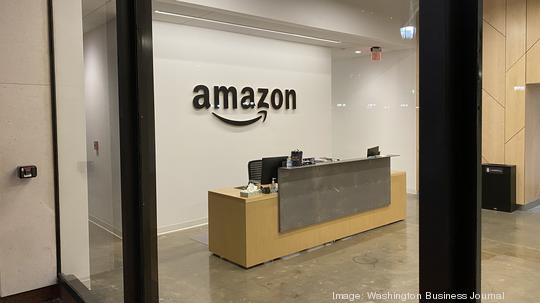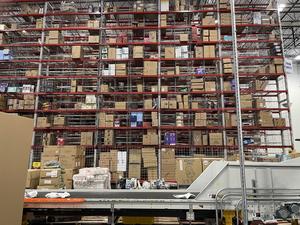
When the Covid pandemic started to surge in the U.S., Jodi Kostelnik shut down The Neighborgoods' brick-and-mortar store in Shaw. The situation was dire.
But then representatives from Amazon Handmade, part of Amazon.com Inc. (NASDAQ: AMZN), reached out to the owner and founder to ask how they could help her small business continue selling dish towels, tote bags and other giftable goods. Amazon’s e-commerce platform promoted The Neighborgoods on its home page for a full month during May 2020.
“It really helped save our business,” Kostelnik said Wednesday at an event hosted by Amazon in Crystal City. “We never sold that much online before, so that really kickstarted our growth for online sales.”
Amazon hosted the panel to spotlight Greater Washington small businesses and highlight resources they use through Amazon’s platform and other tips for connecting to the e-commerce market. The event was held at 1770 Crystal Drive in Crystal City, which Amazon leases from JBG Smith Properties (NYSE: JBGS) as part of its second headquarters, and was also livestreamed on YouTube. About 325 people registered for the event and training, an Amazon spokeswoman said.
Ardine Williams, Amazon’s vice president for workforce development who is based at HQ2, kicked off the event, which was co-led by Isabella Guzman, administrator of the Small Business Administration, and Jim Doyle, president of business policy and research organization Business Forward.
The Neighborgoods now sells its products in 400 stores across the United States, in addition to Amazon.com, Etsy, and its own website. Kostelnik said a key factor in helping to grow her business’ reach was begrudgingly giving in to the necessity of using social media. She took a $5 course on using social media, which pivoted their growth over the past six years.
She also has plugged into a community of “makers” in Greater Washington since moving to the region in 2015, she said. Now, she’s looking for her next physical location to open a store or studio.
Wian van Blommestein co-founded Springfield's Ayoba Foods to share biltong, a dried cured meat from South Africa, with fellow South Africans in the U.S. and others. He now sells the snacks in 200 Whole Foods stores across the East Coast, on Amazon.com, some specialty stores, his own website, and recently expanded to 160 Fresh Market stores as well. In Greater Washington alone, where the business is based, Ayoba Foods products are available in 37 stores, per the company's website.
When the pandemic hit, like many entrepreneurs van Blommestein focused much of the budget on e-commerce. Several tools on Amazon’s e-commerce platform helped his sales, he said, including a virtual bundling option, through which Amazon bundles multiple products on behalf of the seller and sells as individual units.
“That was a really cool way for us to test different products together and figure out what sort of bundles people like to see,” van Bloomestein said, adding another was a cost estimator tool. “One tool that we use that Amazon provided when we were first starting to sell on Amazon is they allow you to put in what you think your cost would be and then your cost of goods and they add their fees in there. You can see what your bottom line will be from the start when you consider pricing on Amazon.”
Not every third-party seller's experience with the platform has been smooth sailing, per some testimonies. Legislators and regulators have scrutinized the company's model for third-party selling with the risk of competition with the Amazon's private label goods amid claims of high charges and price-fixing to sell on the website. Amazon has refuted those charges.
In January, the SBA launched the Small Business Digital Alliance Program, designed to help entrepreneurs use digital tools and build out the digital infrastructure they need to strengthen their businesses. The program partners with the nonprofit Business Forward Inc., as well as tech companies like Amazon and Google.
Amazon offers free training on how to use its e-commerce platform, including on Wednesday at its Crystal Drive office, virtually led by Keri Cusick, the director of Amazon’s small business empowerment team. And Google (NASDAQ: GOOG) is providing 500 free certificates to every small business owner to upskill their employees on how to use digital tools, Guzman said.
“We also know that for too many small businesses, e-commerce remains out of reach and intimidating,” Williams said during the panel. “We are committed to innovate on behalf of those small businesses.
In 2020 alone, Williams said, Amazon invested more than $18 billion in logistics, teams and programs to help its partners grow.
In 2021, 5.4 million people in the U.S. launched small businesses, a 20% growth in entrepreneurship — higher than any other year on record, Guzman said. The largest group of those new founders are women and people of color, and currently 20% of all entrepreneurs are immigrants, she added.
“What we find is that, especially with people of color, there are these barriers in terms of accessing capital or other resources. The SBA is in the business of trying to fund and fill those gaps in communities so that entrepreneurship can thrive everywhere,” Guzman said. “We should leverage that diversity and strength so that we can create more products that everyone gets addicted to."


